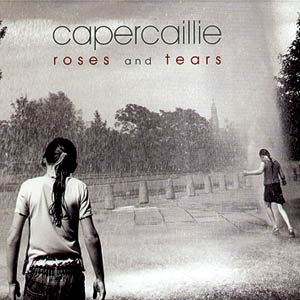 My first acquaintance with Capercaillie was an album that turned out to be a “crossover” — Celtic trad group goes pop. At least some of that pop influence seems to have made a home in the group’s style — I find myself confronted by Roses and Tears, and it’s a refreshing break from my usual diet of loud obnoxious rock and loud obnoxious classical.
My first acquaintance with Capercaillie was an album that turned out to be a “crossover” — Celtic trad group goes pop. At least some of that pop influence seems to have made a home in the group’s style — I find myself confronted by Roses and Tears, and it’s a refreshing break from my usual diet of loud obnoxious rock and loud obnoxious classical.
I have always been impressed by the sophistication of Capercaillie’s music-making, and that’s in full evidence here. There’s a good mix of traditional tunes and contemporary songs in this collection, exploring a range of moods.
Karen Matheson can break your heart without even trying, I think. “Don’t You Go,” a quiet little song that winds around fiddle, whistle, guitar, and that magical voice — and the blending of textures here is remarkable — reaches a depth that I don’t usually expect to find anywhere — at least, not without calling a lot more attention to itself. It’s simply a beautiful song that sneaks up on you, melancholy, longing, leaving you on the verge of tears. (Somehow, Capercaillie manages to do that to me at least once on every album.)
But that magic persists — “O Lioba Có Leathag/Mo Ghún” bounces right along with that lilt that I can only call “Celtic,” and something that I’ve not really noticed in traditional music thus far, although I suspect I just wasn’t paying attention: Capercaillie puts a degree of crispness into their performance here that points up the innate tensile strength of the music. That crispness blends with a remarkably fluid delivery on such numbers as “The Quimper Waltz/An Damez Kozh” to create a good, rich texture to the music.
I mentioned sophistication earlier. Take this as meaning that the group can incorporate what to this ear at least seems to be various influences so subtly and seamlessly that you’re not sure if it’s really something they’ve introduced or not. “Oran Sugraidh (The Flirting Song)” is one such — composed by Duncan Ban MacIntyre, it’s definitely a traditional-sounding tune, until you take a closer listen to the syncopated rhythms and the near-jazz feel of the keyboards. That jazz feeling pops up again in the introduction to “Soldier Boy,” which also leads to another assault on your heart by Matheson. (This is the song that gave the album its title.)
All in all, it’s an appealing collection — as I noted, a nice interlude from things that may demand your attention more strenuously. If I have a criticism of Roses and Tears, it is that it is perhaps too mellow. There are a couple of selections — “Turas an Ànraidh/Gheibh Sinn Ribinnean Mòra Mòra” and “The Reverend/The Hare’s Paw/Rose Cottage” stick out — that display the kind of energy I’ve come to expect from traditional Celtic music. But that’s an “if” — when push comes to shove, I’ll take the magic any time.
On this recording, Capercaillie is Karen Matheson, vocals; Manus Lunny, bouzouki, guitar and vocals; Ewen Vernal, bass, vocals; David Robertson, percussion; Donald Shaw, piano, Rhodes, and accordion; Charlie McKerron, fiddle; Michael McGoldrick, flute, whistles, pipes; and Che Beresford, drums. Signy Jacobsdottír provided additional bells, gongs, and darabuka.
(Compass Records [Vertical Records], 2008)
